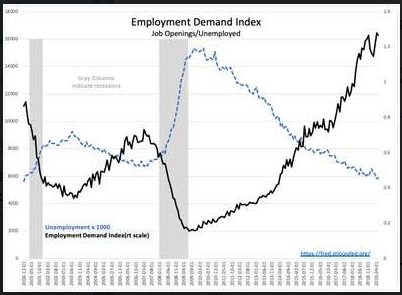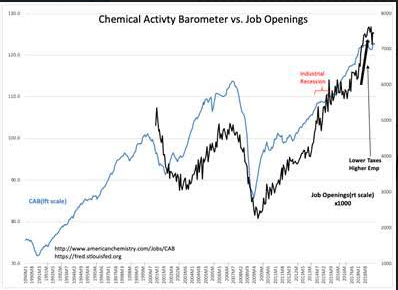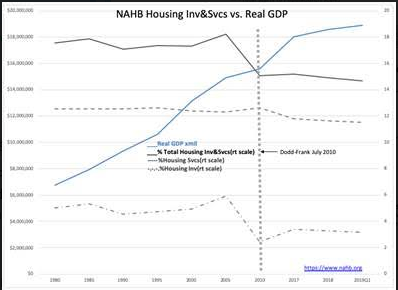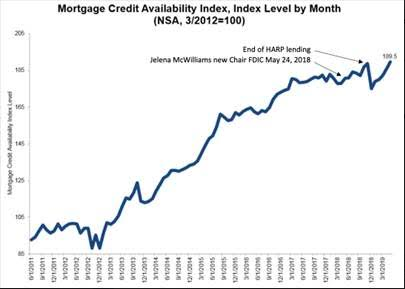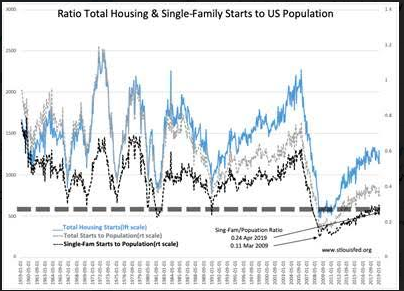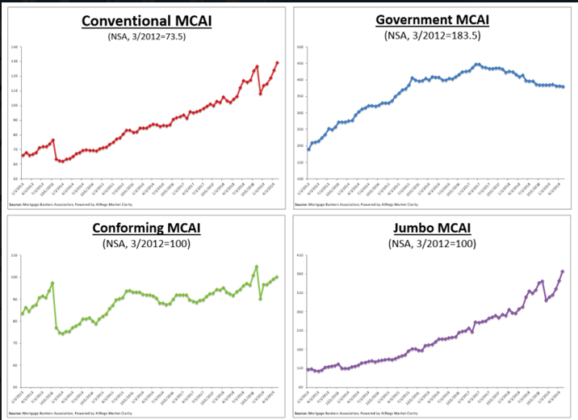Not a very recessionary signal…
“Davidson” submits:
Employment Demand posts new high..CAB reaching towards establishing a new high
Employment Demand posts new high on revised data for April 2019. Revisions are typical for much of economic data as late reports are added to the trends. April 2019 1.297 is higher vs Dec 2018 1.267. April 2019 Employment Demand Index represents nearly 30% more Job Openings than unemployed individuals. The Chemical Activity Barometer(CAB) is a few tenths from establishing new highs. These and other economic indicators point to continued economic expansion the next couple of years.
Additional support is coming with a significant change in mtg lending.
Big story building with mtg lending
Single-Family housing is well known to be in a deficit vs. the historic demand from the US population.(see Ratio Total Housing & Single-Family Starts to US Population) The issue has been regulations on community banks from Dodd-Frank which treated Money Center Banks and Community Banks with the same broad regulatory regime. NAHB indicates that the Total Housing impact as 18% of Real GDP. (see NAHB Housing Inv&Svcs vs. Real GDP) This percentage fell rapidly due to Dodd-Frank after 2010 to 14.7% 1Q19. The NAHB chart is plotted in 5yr increments from 1980-2010 with the next point being 2017’s reading, followed by 2018 and 1Q2019.
If regs are eased for small banks such that we return to 18% housing, it will equate to an increase of 3.3%. If only half of this occurs, i.e. 1.6%, we can see Real GDP rise $302Bil annually (by $18.9Tril x 0.016 = $302Bil) $302Bill annually for 3yr-5yrs till we catch up to historical housing demand. We should experience extra GDP growth and capital will flow everywhere.
The Mortgage Bankers Assoc https://www.mba.org just reported a new high for this cycle of its MCAI Index of 189.5. One year ago, the current administration recognizing the negative impact of Dodd-Frank was having on Single-Family ownership, appointed Jelena McWiliams as the new Chair of FDIC. Shortly afterwards, there appeared early signs that the logjam of mtg lending under Dodd-Frank was easing. In Dec 2018, the HARP lending program came to a halt and lending activity plunged 7.3% to 175. Lending since then has recovered and is poised to rise higher.
This is not a return to the subprime government lending which led to the Subprime Crisis caused by Fannie and Freddie Mae. This lending improvement is at the community bank level as can be seen in the Conventional and Jumbo MCAIcharts. Historically, permitting community banks to control their own underwriting relative to FDIC regs has proven more prudent than forcing them to comply with politically motivated outcomes dictated from Washington.
The current investment outlook appears quite positive. The agreement with Mexico on immigration controls is a positive addition. Should the US initiatives to lower global tariffs prove successful, US equities are likely to rise significantly.

